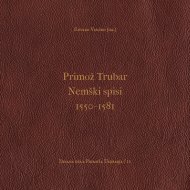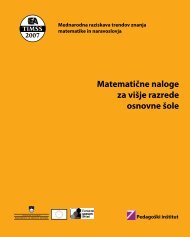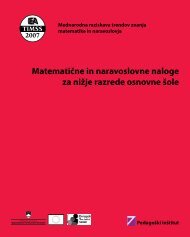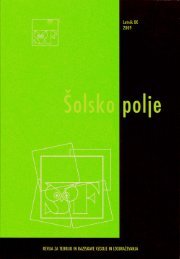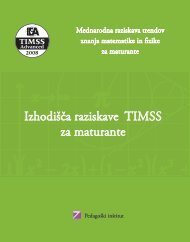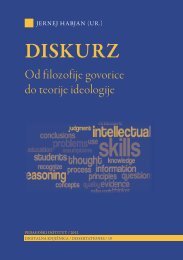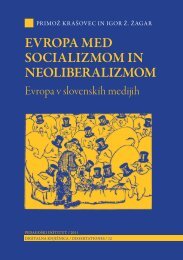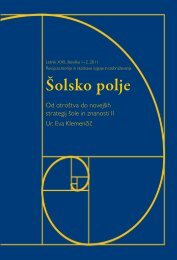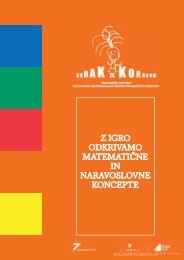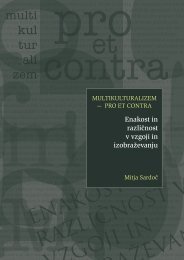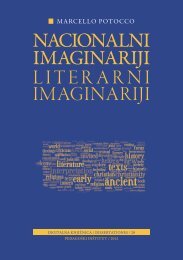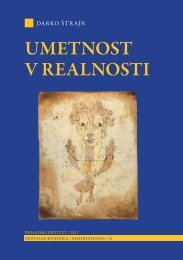Šolsko polje, letnik XX, številka 5-6, 2009: Vloga ... - Pedagoški inštitut
Šolsko polje, letnik XX, številka 5-6, 2009: Vloga ... - Pedagoški inštitut
Šolsko polje, letnik XX, številka 5-6, 2009: Vloga ... - Pedagoški inštitut
You also want an ePaper? Increase the reach of your titles
YUMPU automatically turns print PDFs into web optimized ePapers that Google loves.
THE VOICE OF AN AGENDA-SETTING AUTHORITY - CONTENT CHARACTERISTICS ...105civic skills...deep-seated prejudice...and have yet little willingness to reconceptualizetheir prejudices or anxieties in language familiar to Westerners’(Fine, 1996: 559). Both of these opinions favor international intervention inBiH, which is seen as a course of action ‘without an alternative’.More recent and rather different opinions emerged later critiquingthe ‘noble experiment’ as ‘a mockery of any meaningful concept of democracy’and a ‘grotesque parody of democratic principles’ (Carpenter,1997 in Chandler, 2000: 158, 190). Paddy Ashdown has received much criticismregarding his colonial-style politics, ‘running Bosnia like Raj’, and‘making much greater use of his untrammeled powers as a ‘benevolentdespot’ than his predecessors (Traynor, 2003). The critique of the ‘evangelicbelief’ in imposing democracy from above and its similarities withthe British East India Company was a theme of Knaus and Martin’s article‘Travails of the European Raj’ (2003).With a great deal of caution and diffidence there has, however, beensome systematic critique against the OHR policy in the realm of internationalrelations but little in discourse and media studies. Western politicianshave been blamed for their lack of accountability to BiH citizens. Theyhave been forcing statehood upon the divided Bosnian ethnic groups atall costs and at the expense of society. Ten years after Dayton, there is no‘positive peace’, as a form of cooperation and integration (Galtung, 1968in Roach, 1993), but ‘negative peace’, as a mere lack of organized violencebetween the main ethnic groups. A more detailed insight into the inadequaciesof the Western efforts in terms of society building in Bosnia andHerzegovina and their subsequent inability to guarantee the BiH stabilityis given by Yordan (2003), who says the initial intervention of the EU andUSA were led by their personal interests and not humanitarian ideals.American negotiators wrote the GFA with the assistance of Western Europeans andRussian diplomats. While the parties to the peace talks could debate these provisions,they were not allowed to make any substantive changes. Through diplomatic armtwisting, the U.S. forced the parties to sign the peace agreement, even though someof its provisions contradicted their self-interest. In the end, the GFA can be seen asan instrument of conflict settlement, rather than one of conflict resolution. It didnot permit the leaders of ethno-national group to negotiate an ending to their warand it did not provide an incentive for Bosnia’s political leaders to address the veryproblems that had led them to war. Instead a settlement was forced upon them,angering many of Bosnia’s politicians and stripping them of their right to create asociety that best represents their needs and interests (Yordan, 2003: 62).The Dayton Peace Agreement (GFA) in newly built Bosnian state wasdesigned to stop the war and introduce capitalism and democracy as a



